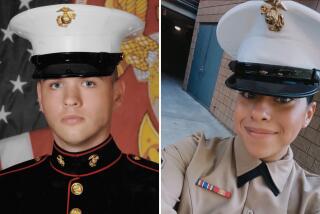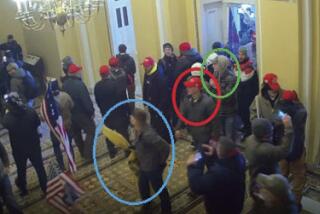Marines refuse to testify against leader
Two Marines refused to testify Friday against a former squad leader accused of killing Iraqi detainees, angering a prosecutor who said their refusal does grave harm to the government’s case in the first civilian trial of a former service member accused of violating military rules of engagement.
The prosecutor asked the judge to jail the Marines for failing to testify, but the judge refused.
U.S. District Judge Stephen Larson, who is presiding over the trial in Riverside of former Sgt. Jose Nazario, said putting Sgt. Ryan Weemer and Sgt. Jermaine Nelson in jail would not convince them to testify. He had jailed both for refusing to testify to the grand jury earlier this year.
Weemer and Nelson face murder charges at Camp Pendleton in the same alleged killings with which Nazario is charged. The prosecution against Nazario is being watched closely because of its unique blend of the civilian and military worlds.
In the past, Weemer and Nelson have given detailed statements about the 2004 incident, which occurred in the first day of the Marines’ bloody, 10-day assault on insurgent strongholds in Fallouja, west of Baghdad.
Separately, the two told of taking four Iraqis as prisoners in a barricaded house and said Nazario killed two of them and ordered them to kill one each. The Marines opted to kill the four rather than take time to process them according to the law-of-war rules during the fast-moving battle, the two alleged.
On Friday, Assistant U.S. Atty. Jerry Behnke asked Larson to immediately put Nelson and Weemer in jail for six months. Larson refused, but set a Sept. 29 hearing to determine what, if any, punishment the two Marines should receive for being in contempt of court.
Attorneys for Nelson and Weemer said their clients are concerned that their testimony could be used against them in their upcoming courts-martial. Larson said he has been assured by Marine superiors that the immunity given the two in federal court will be honored.
Still, the two Marines would not budge, to the exasperation of Behnke, who called the move “a fraud on this jury.”
“I don’t think what is happening now is right and fair to the government and the United States,” Behnke said.
Larson said he shares Behnke’s frustration but is convinced nothing will coerce the two combat veterans to testify. “My suspicion is, given what the men have been through, there is not a lot they’re afraid of,” Larson said.
Nazario is charged under a 2000 law that allows federal prosecutors to charge Department of Defense civilian employees and contractors for crimes committed overseas. Nazario’s supporters insist a civilian jury cannot understand the chaos and pressures of combat.
Weemer and Nelson on Friday were dressed in their military uniforms. Outside the courtroom, each embraced Nazario, who wore civilian clothes, and when they entered the courtroom they called one another “brother.”
Before Larson decided whether to jail the two Marines, Joseph Low, who represents Nelson, asked the judge to consider “the unique sacrifices Sgt. Nelson has made for all of us -- that we all live under the blanket of freedom he provides with the blood that flows through his veins.”
Weemer’s attorney, Chris Johnson, asked Larson to “look at the Purple Heart on this decorated Marine’s chest.”
Weemer and Nelson initially said they would not testify because the immunity from prosecution that they received did not extend to the military courtroom. The letter of immunity came from a top lawyer at Camp Pendleton but not the top general.
But when Larson asked about it, they said they would not testify even if they had a signed letter of immunity from the general.
“Well, this has been a charade then, hasn’t it?” Larson said.
Earlier, Larson had told the Marines that “nothing that is said in this courtroom can be used down at Camp Pendleton.”
Weemer’s past admissions about the killings came during a polygraph test administered in 2006 by the Secret Service when he was applying for a job. His admission provoked the investigation that led to military charges against him and Nelson, and civilian charges against Nazario, who had left the Marine Corps in 2005 after eight years.
Nelson spoke to a Naval Criminal Investigative Service agent in 2007 and later, at the agent’s request, made a telephone call to Nazario and tried to get him to make incriminating statements.
Nelson, in the interview with the agent, said Nazario told him during the battle, “I’m not doing this (expletive) all myself. You’re doing one and Weemer is doing one.”
Once they hired attorneys, neither Weemer nor Nelson has been willing to discuss the Nov. 9, 2004, incident with investigators for the prosecution.
Both refused to testify before a federal grand jury investigating Nazario’s role even though prosecutors promised that nothing they said could be used against them in their courts-martial.
After they still refused to testify, they were found in contempt of court by Larson and jailed.
Nelson, 26, served 18 days in two stretches, and Weemer, 25, served 21 days before Larson determined that keeping them behind bars would not compel them to testify.
The issue of whether a promise of immunity in the federal court can be binding on prosecutors in the military system is one of the legal complexities of the case. Another issue is whether military prosecutors will gain an advantage against Weemer and Nelson by listening to them testify at Nazario’s trial.
Several Marine Corps prosecutors from Camp Pendleton were in the audience in the Riverside courtroom
Weemer and Nelson, despite their early cooperation and admissions, face more serious charges than Nazario, who has denied any wrongdoing. Weemer and Nelson face unpremeditated murder charges that could bring life sentences.
Weemer and Nelson are still in the Marine Corps at Camp Pendleton.
Both have received the military equivalent of a preliminary hearing and been ordered to trial by Lt. Gen. Samuel Helland, commanding general of the Marine Force Central Command.
The charges against Nazario -- manslaughter, assault and using a firearm in a violent crime -- carry a maximum sentence of about 10 years, according to federal prosecutors. He was charged in federal court because he had left the Marine Corps, and thus was not subject to military law, before the investigation began in 2006.
On Thursday, Nazario’s attorneys indicated that they plan to use a two-pronged defense: The killings did not occur, but if they did occur, they were justified during the violent, fast-moving battle in Fallouja as Marines sought to protect themselves against insurgents eager to kill them.
Larson ruled Thursday that if Weemer does not testify, his interview with the Secret Service cannot be used by the prosecution as evidence. The judge did not mention Nelson’s tape-recorded interview with the Naval Criminal Investigative Service.
Much of the pretrial discussion has involved whether civilian jurors judging Nazario’s actions can understand combat.
But the case could hinge on the issue of whether jurors believe there is sufficient evidence that any killings occurred.
Prosecutors intend to call two Marines who were part of the same squad and allegedly saw the dead bodies minutes after they were shot but did not witness the shootings.
“There was no self-defense, there was no hostile intent [shown by the Iraqis],” Behnke said. “These were executions.”
--
More to Read
Sign up for Essential California
The most important California stories and recommendations in your inbox every morning.
You may occasionally receive promotional content from the Los Angeles Times.










